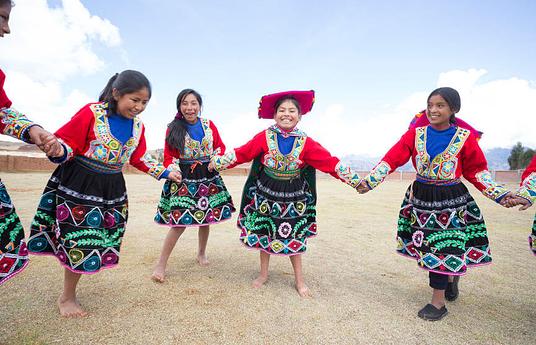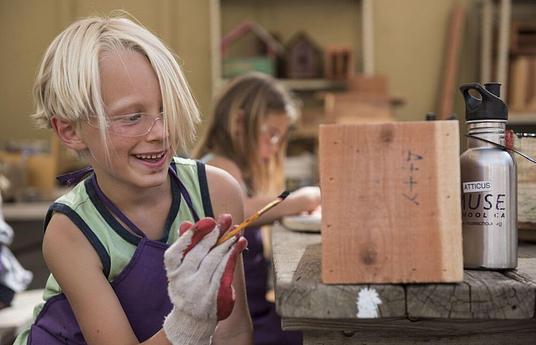Want to know how to create a curriculum that helps kids build 6C skills whilst also making sure they get the exam results they need to succeed? We spoke to Rae Snape, a UK-based Headteacher at the Ofsted Outstanding elementary school, The Spinney in Cambridge, and HundrED Academy member, to find out how she manages it.
Please introduce yourself and your school
The Spinney is a happy and successful school, judged to be “Outstanding” by Ofsted and one which is immensely proud of the cultural and linguistic diversity of the community that we serve. In 2014 the Spinney was designated as a National Teaching School and is the lead school of The Kite Teaching School Alliance.
I have been the proud headteacher (and since 2014 a National Leader of Education) at the Spinney for well over a decade and working with the team we identified seven values that inform the quotidian and the long term strategic business of the school. These are Child-centeredness, Teamwork and Community, Excellence, Learning, Improvement, Responsibility and Optimism.
Visitors to our school frequently comment on the warm welcome, the positive relationships and the warmth of our school community. This is important to us as we believe that relationships and connecting with others is everything.
What is your approach to assessment and teaching life skills, such as the 6Cs?
Children in England are amongst the most tested in Europe. For schools in England these tests are often described as “high stakes” as results are published publically and the outcome of high stakes testing can sometimes determine which schools children will go on to. At the Spinney we therefore feel we owe it to children and their families to give them the skills to “ace the tests” so that they can have choices about the opportunities available to them as they continue their learning journey. But we also owe it to them to ensure that they have the skills, qualities and competencies to be successful in all areas of life; to be happy and sociable, to be confident in themselves, to be resilient, to be able to work with others, to be able to problem solve, to create and to think critically.

To this end essential literacies and competencies are prioritized in our instructional curriculum, reading, writing, mathematics, coding, drawing for example are balanced alongside other essential pro-social skills such as compassion, communication, collaboration, reciprocity, self-agency.
Our curriculum offers our pupils tacit and specific subject knowledge so that children learn about people, places and the planet now (through geography, ecology and sustainability) as well as in the past (history, art). We also ensure that there are lots of opportunities through the Arts for children to create, connect, perform and collaborate.
How do you manage to balance assessment and teaching life skills?
As a “forward thinking outward reaching” school we recognize how important it is to connect with others in the Education Eco-System if we are to get this balance right between ‘Training for the test and teaching for life.’
By connecting to the eco-system and being open to new ideas and innovations we have introduced various approaches into our curriculum and pedagogy that complements the teaching of the 6 Cs and our curriculum is a Smorgasbord of complementary programmes, partnerships and pedagogies that ensure that we offer a broad balanced and whole education for every child.
Here are just a few of the partnerships and programmes that we have at The Spinney:
-
Character Education – MindUp, Random Acts of Kindness Foundation
-
Citizenships – The Global Goals, World’s Largest Lesson and LYFTA
-
Communication – EmpathyLab & Skills Builder
-
Critical Thinking and Problem Solving – Maths No Problem
-
Collaboration – SEAS4All Dialogic Literary Gatherings
-
Creativity: Partners for Youth Engagement Access Arts and STEAMCo
Why is it important to incorporate education innovations into school life?
As educators we purposefully reach out and cherry pick ideas and innovations from across the educational ecosystem. We do this to curate a meaningful local/global creative and connected curriculum to ensure that our children have the skills, knowledge and competencies to be happy now, fulfilled in the future and able to make the world an even better place. One of the ways we do this is through the Ashoka network.
We are one of only 15 Ashoka Changemakers schools in England, joining a network of 300 changemaker schools across the world. Through the Ashoka network, The Spinney has had wonderful experiences to connect with and hear from some of the world’s most inspirational educational thought leaders and to reflect deeply on what our curriculum offer should be for the young people in our school.
If people want to find out more about the theory behind your approach, what do you recommend them reading?
Here are a few of the papers about Educational Eco-Systems that we have found useful at the Spinney:
- “Educational Ecosystems: A Trend in Urban Educational Innovation” Dr. Mustafa Abdul-Jabbar, Harvard Law School”
- “The Outward Looking School and Its EcoSystem” – OECD
- “Educational Eco Systems for Societal Transformation” Global Education Futures Report
Another privilege has been to meet Valerie Hannon who in her book “Thrive” describes the importance of reinventing schools for the real challenges we face and suggests we think about how we support our young people to Thrive in 4 domains: Intrapersonal, Interpersonal, Societal, Planetary and Global.
These frameworks and the work of Michael Fullan (and other thought leaders) have influenced our pedagogy at The Spinney. I am currently reading Michael Fullan’s latest book “Deep Learning - Engage The World, Change The World.” The book offers case studies from across the world demonstrating how educators are deepening learning for their students through implementing the 6Cs. Character Education, Citizenship, Communication, Critical Thinking and Problem Solving, Collaboration, Creativity.
Can people reach out to you to learn more about your school?
If you would like to know more about what we do, or would like to come and visit, please do not hesitate to contact us via the Spinney School website!





